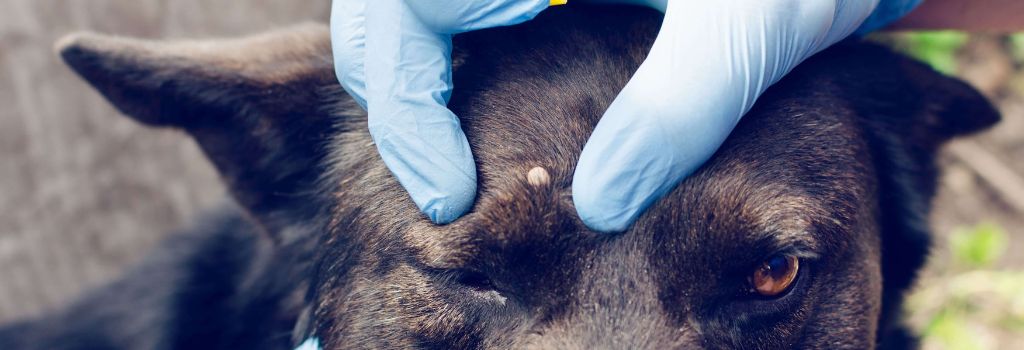Lyme disease is a bacterial infection that affects both humans and dogs. It’s prevalent in many areas of the United States, particularly in the Northeast, Midwest, and Pacific Coast. With summer approaching and our furry companions spending more time outdoors, understanding Lyme disease and how to protect your dog becomes even more important. As veterinarians, we want to ensure you have the information you need to keep your pet safe and healthy throughout Prevent Lyme Disease in Dogs Month and beyond.
Understanding Lyme Disease in Dogs
The culprit behind Lyme disease in dogs is the blacklegged tick (or deer tick). These tiny hitchhikers live in wooded and grassy areas, waiting for a chance to latch onto a passing animal (or human) for a blood meal. While ticks go through various life stages, it’s the nymph and adult stages that are most likely to transmit Lyme disease.
Once attached to a dog (or another host), a blacklegged tick can take several days to feed. During this feeding process, if the tick is carrying Borrelia burgdorferi, it can transmit this bacteria into your dog’s bloodstream. It’s important to note that not every tick bite transmits Lyme disease, and some dogs may not develop symptoms for weeks or even months after infection.
Lyme Disease Symptoms
Unfortunately, Lyme disease can be a bit of a stealthy enemy. Its most common symptoms often mimic other illnesses, making early detection a challenge. The symptoms may also vary from one pet to another.
Common symptoms of Lyme Disease include:
- Fever: An unexplained elevation in body temperature is a common early indicator of Lyme disease.
- Lameness: Dogs with Lyme disease may exhibit limping or stiffness in one or more legs. This lameness can shift, meaning it might appear in different legs at different times.
- Lethargy: If your usually energetic dog seems tired and disinterested in activities they normally enjoy, it could be a sign of Lyme disease or another underlying condition.
- Loss of appetite: A decrease in appetite, especially coupled with other symptoms, is always a cause for concern.
- Swollen lymph nodes: Part of the immune system, lymph nodes can enlarge when the body is fighting off infection.
While these are some of the most common signs, it’s important to remember that Lyme disease can manifest in other ways, as well. Less frequent symptoms include facial swelling, depression, difficulty breathing, and even seizures. If you notice any unusual symptoms in your canine companion, it’s best to err on the side of caution and seek veterinary care. Whether it’s Lyme Disease or something else, early detection and treatment provide the best prognosis.

Protecting Your Dog from Lyme Disease
An ounce of prevention, as the saying goes, is worth a pound of cure. This couldn’t be truer when it comes to Lyme disease in dogs. While complete prevention is never guaranteed, taking proactive steps significantly reduces your dog’s risk of contracting the disease. And preventing Lyme disease is much easier than treating it.
There are several different options available for preventing tick infestations on your dog.
Here’s a breakdown of some of the most common preventives:
- Prescription medications: These oral medications are highly effective in killing ticks that may try to attach to your dog. They come in various forms, and your veterinarian will recommend the best medicine based on your dog’s age, breed, and lifestyle.
- Topical treatments: These spot-on applications are applied directly to your dog’s skin at regular intervals, typically monthly. They work by repelling and killing ticks before they have a chance to attach and transmit diseases.
- Tick collars: These collars contain insecticides that repel and kill ticks. While convenient, they may not be as effective as other methods and irritate some dogs’ skin.
It’s important to talk to your veterinarian to determine the best tick prevention method for your dog. Factors like your dog’s age, breed, lifestyle, and the prevalence of ticks in your area will all play a role in choosing the best option for your canine companion.
In addition to preventative medications and treatments, regular tick checks are another crucial element in protecting your dog from Lyme disease.
Diagnosis and Treatment of Lyme Disease
Even with the best preventative measures, there’s always a chance your dog might encounter a tick carrying Lyme disease. If you think your dog may have been exposed, seeking immediate veterinary attention is crucial.
While at-home tests for Lyme disease are available, these tests can be unreliable and may not provide an accurate picture of your dog’s health. We strongly recommend having your pet diagnosed by a qualified veterinarian. Through a comprehensive examination and diagnostic tests, we can accurately determine if your dog has Lyme disease and develop an effective treatment plan.
Diagnostic Tests Performed by Veterinarians
The most common diagnostic test for Lyme disease in dogs is a blood test that detects antibodies to the Borrelia burgdorferi bacteria. The immune system creates these antibodies in response to the infection. It’s important to note that a positive antibody test doesn’t necessarily confirm active Lyme disease.
Depending on your dog’s specific symptoms, your veterinarian may recommend additional tests to assess the extent of the infection and identify potential complications. These additional tests might include X-rays, joint fluid analysis, or neurological evaluations.

Treatment Options for Lyme Disease
If your dog has Lyme disease, the good news is that it’s a treatable condition. The most common treatment for Lyme disease involves a course of antibiotics. The type and duration of antibiotic treatment varies depending on the severity of the infection.
It’s critically important to complete the prescribed course of antibiotics, even if your dog starts feeling better. Stopping the medication early can allow the bacteria to survive and potentially lead to a relapse or more serious complications.
In addition to antibiotics, your veterinarian may recommend other medications to manage your dog’s symptoms, such as pain relievers or anti-inflammatory drugs. They may also recommend supportive care, such as rest and restricted activity, during the recovery period.
Living with a Dog Diagnosed with Lyme Disease
A diagnosis of Lyme disease can be concerning, but with treatment and care, most dogs make a full recovery.
Here’s what you can expect if your dog has Lyme disease:
- Following Treatment Plans and Recommendations: Following your veterinarian’s prescribed course of medication and adhering to any recommended activity restrictions are crucial for your dog’s recovery.
- Supportive Care: Providing a comfortable, stress-free environment for your dog can aid their healing process. Offer plenty of rest, ensure fresh water is readily available, and adjust their activity level as advised by your veterinarian.
- Long-Term Management (if applicable): In some cases, Lyme disease can cause long-term joint problems. If your dog experiences persistent lameness or stiffness, your veterinarian may recommend additional therapies like physical therapy or pain management medications to improve their quality of life.
Closing Thoughts
Lyme disease is a serious illness, but with awareness, prevention, and prompt veterinary care, it doesn’t have to be devastating. Remember, early detection is key! If you notice any signs that might indicate your dog has been exposed to Lyme disease, such as a tick bite, fever, lameness, or lethargy, schedule an appointment with your veterinarian right away. Early diagnosis and veterinary treatment can prevent complications and ensure a full recovery.
Take action today to protect your dog’s health and well-being.
If you have questions and you'd like to reach out to us, you can call us directly at (941) 253-5218, or you can email us at staff@uacvet.com. Don't forget to follow us on social media Facebook, Instagram.
